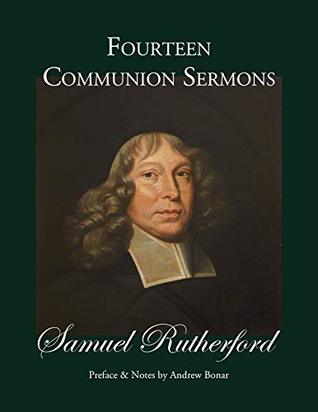- Bible
- Read the Bible
- Bible Versions
- Verse of the Day
- Reading Plans
- Verses by Topic
- Books of the Bible
- Bible Images
- Study
- Commentaries
- Concordances
- Dictionaries
- Encyclopedias
- Sermons
- Bible Atlas & Maps
- BP Wiki
- Devotionals
- Today's Devotionals
- Light of the World
- All Devotionals
- Inspirational Quotes
- More
- Picture Quotes
- Videos
- Inspirational
- Bible Study
- What The Bible Says
- Bible Q&As
- Daily Bread
- Bible by Genre
- Bible Stories
- Random Bible Verse
- Community
- Store
Fourteen Communion Sermons: with a Preface and Notes by Rev. Andrew A. Bonar, D.D.
Preface
PrefaceALL who relish “Samuel Rutherford’s Letters” will welcome the reprint of this volume, entitled, when first printed, “Collection of Valuable Sermons Preached by him at Sacramental Occasions, in the years 1630, 1634, and 1637.” I have added two discourses to the collection, one preached in 1630, and another in 1633, and also what is commonly called a Communion Address, delivered in London.
ALL who relish “Samuel Rutherford’s Letters” will welcome the reprint of this volume, entitled, when first printed, “Collection of Valuable Sermons Preached by him at Sacramental Occasions, in the years 1630, 1634, and 1637.” I have added two discourses to the collection, one preached in 1630, and another in 1633, and also what is commonly called a Communion Address, delivered in London.All breathe the same spirit as the famous “Letters,” and are full of racy remark and illustration, bearing on scriptural doctrine and Christian experience.
All breathe the same spirit as the famous “Letters,” and are full of racy remark and illustration, bearing on scriptural doctrine and Christian experience.The Sermons were not published by himself, but from the notes of hearers, and so there are some awkward sentences and clauses. But still they are exceedingly valuable. The first nine sermons were originally printed at Glasgow, “from an old manuscript.” The rest have frequently appeared in various forms. A Sermon, which bears the title, “The Cruel Watchman,” and a fragment, “Christ’s Voice from Heaven,” are not genuine, and so are not included in this collection. His only other Sermons are that on Luke 8:22, preached before the House of Commons, 1644, and that on Daniel 6:26, preached before the House of Lords, 1645.
The Sermons were not published by himself, but from the notes of hearers, and so there are some awkward sentences and clauses. But still they are exceedingly valuable. The first nine sermons were originally printed at Glasgow, “from an old manuscript.” The rest have frequently appeared in various forms. A Sermon, which bears the title, “The Cruel Watchman,” and a fragment, “Christ’s Voice from Heaven,” are not genuine, and so are not included in this collection. His only other Sermons are that on Luke 8:22, preached before the House of Commons, 1644, and that on Daniel 6:26, preached before the House of Lords, 1645.ANDREW A. BONAR.
GLASGOW, 1876.
Preface to the Second Edition
GLASGOW, 1876.
Preface to the Second Edition
THE first issue of two thousand copies has been sold off within a year. In the meantime, two more of S. Rutherford’s Sacramental Sermons have been sent to the Editor by friends who had them in their possession, and were happy to offer this addition to the First Twelve. They are given in this volume.
THE first issue of two thousand copies has been sold off within a year. In the meantime, two more of S. Rutherford’s Sacramental Sermons have been sent to the Editor by friends who had them in their possession, and were happy to offer this addition to the First Twelve. They are given in this volume.ANDREW A. BONAR.
GLASGOW, 1877.
GLASGOW, 1877.
CrossReach Publications
CrossReach PublicationsBUY NOW
Published November 19th 2018 by CrossReach Publications

Rutherford was also known for his spiritual and devotional works, such as Christ Dying and drawing Sinners to Himself and his Letters. Concerning his Letters, Charles Spurgeon wrote: "When we are dead and gone let the world know that Spurgeon held Rutherford's Letters to be the nearest thing to inspiration which can be found in all the writings of mere men". Published versions of the Letters contain 365 letters and fit well with reading one per day.
Rutherford was a strong supporter of the divine right of Presbytery, the principle that the Bible calls for Presbyterian church government. Among his polemical works are Due Right of Presbyteries (1644), Lex, Rex (1644), and Free Disputation against Pretended Liberty of Conscience.
Samuel Rutherford was a Scottish Presbyterian theologian and author. He was one of the Scottish Commissioners to the Westminster Assembly.
Born in the village of Nisbet, Roxburghshire, Rutherford was educated at Edinburgh University, where he became in 1623 Regent of Humanity (Professor of Latin). In 1627 he was settled as minister of Anwoth in Galloway, from where he was banished to Aberdeen for nonconformity. His patron in Galloway was John Gordon, 1st Viscount of Kenmure. On the re-establishment of Presbytery in 1638 he was made Professor of Divinity at St. Andrews, and in 1651 Rector of St. Mary's College there. At the Restoration he was deprived of all his offices.
Rutherford's political book Lex, Rex (meaning "the law [and] the king" or "the law [is] king") presented a theory of limited government and constitutionalism. It was an explicit refutation of the doctrine of "Rex Lex" or "the king is the law." Rutherford was also known for his spiritual and devotional works, such as Christ Dying and drawing Sinners to Himself and his Letters.
... Show more